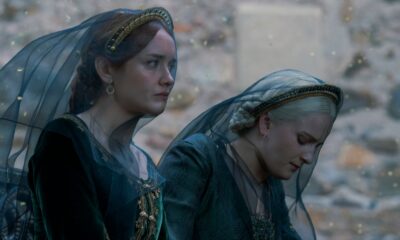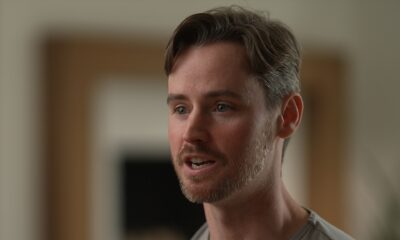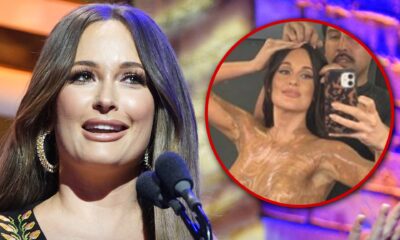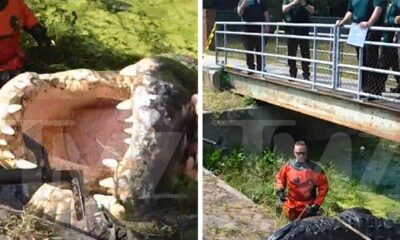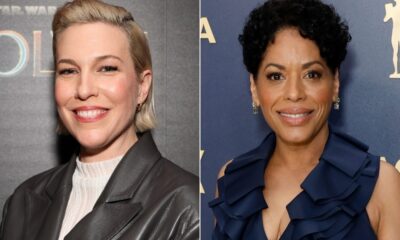Entertainment
Aemond nude scene, Milly Alcock cameo explained
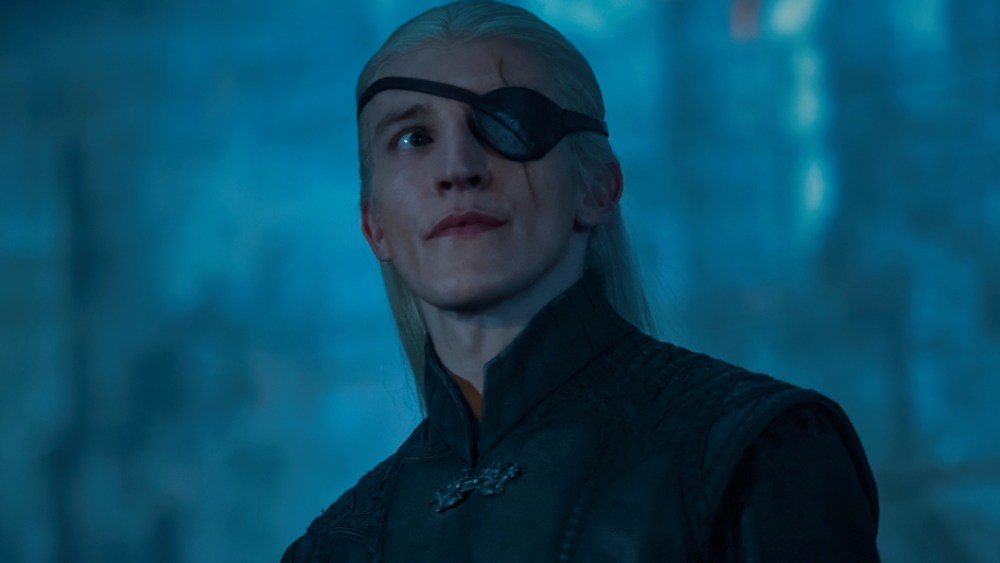
SPOILER ALERT: This article contains major spoilers for Episode 3 of HBO’s ‘House of the Dragon’ Season 2.
With a new episode of “House of the Dragon” comes another funeral.
Shortly after the funeral of the young Prince Jaehaerys, the Cargyll twins were buried following their brother-versus-brother duel last week. For the first time this season, no major characters died in ‘House of the Dragon’ – except for a bunch of soldiers from House Blackwood and House Bracken in the Battle of the Burning Mill.
Although it took place off-screen, the first official battle of the Dance of Dragons has been fought, leaving hundreds of bodies in the fields. Not far away, Daemon Targaryen (Matt Smith) arrived at the ancient, leaky castle of Harrenhal and claimed it for himself without any bloodshed. Ser Simon Strong (Simon Russell Beale) immediately bowed the knee to Daemon and offered him a modest supper in return (and accidentally continued to address him as prince instead of king).
Long considered a cursed castle due to all the deaths its hallowed halls have seen, Harrenhal isn’t exactly a five-star Daemon hotel (or even a two-star Airbnb). He begins having disturbing visions, including one of the young Rhaenyra Targaryen (Milly Alcock reprising her role from Season 1) sewing Jaehaerys’ head back on. The vision marks Alcock’s first return to the series after playing Rhaenyra in the first half of Season 1.
King Aegon II Targaryen (Tom Glynn-Carney) officially makes Larys Strong (Matthew Needham) his master of whispers. Larys convinces the king not to join the war effort just yet, while his new hand Criston Cole (Fabien Frankel) sets out with Gwayne Hightower (Freddie Fox), brother of Alicent Hightower (Olivia Cooke), and their troops . Tensions are high between the two knights, as Criston has just ousted Gwayne’s father Otto Hightower (Rhys Ifans) as hand to the king. They barely survive an encounter with Daemon’s daughter Baela Targaryen (Bethany Antonia), who was exploring her dragon. On Dragonstone, the black council advises Rhaenyra (Emma D’Arcy) to raise an army, and she sends her youngest children, Joffrey, Viserys II, and Aegon III, with Rhaena Targaryen (Phoebe Campbell) across the sea for safety.
Back in King’s Landing, Aegon goes out on a drunken night of debauchery with his Kingsguard friends and encounters his brother Aemond Targaryen (Ewan Mitchell) nude cuddling with a prostitute.
“He needs a little love. He’s a broken boy, he needs someone to fix him. Season 1 was a rich show full of morally compromised gray characters. I wanted to present a character who, in those three episodes, that time in his life was just complete darkness,” Mitchell shared Variety. “Someone recently asked me if I thought Aemond had mommy issues, and I don’t know if he had mommy issues or if he just wanted his mom to love him a little more. Growing up, he never really felt that unconditional love. He had to find surrogates elsewhere. He’s kind of found it in his dragon, Vhagar, this older female dragon, and he’s also found it in the madam. But whether or not it is enough, whether it is a worthy enough surrogate, is open to question.”
The episode ends not with another fight scene, but with a surprising war of words, as Rhaenyra sneaks into King’s Landing to talk to Alicent and try to avert the war. Rhaenyra, disguised as a septa, ambushes Alicent while she is praying in the church. The two silently argue over King Viserys’ rightful heir and his misinterpreted prophecy about the “prince who was promised” in the Song of Ice and Fire. Director Geeta Patel, who also directed the season 2 finale, talks to Variety about the tense conversation, Aemond’s nude scene and all the hate Criston Cole gets online.
Theo Witteman
The secret meeting between Rhaenyra and Alicent doesn’t appear in the original “Fire & Blood” book, and it’s the first time we’ve seen them meet since last season. How did you create this brand new scene?
It was very purposeful that you have this moment where your protagonists actually confront each other. It was important for the writers to have Rhaenyra and Alicent bring it home and be the backbone of the season, because that’s the backbone of the first season: these two women’s relationship. To expand the world, we wanted to be able to return to them. What the writers and the actors did so well is that at the end of episode 3 they incorporated episodes 1 and 2 into it. It’s almost a litmus test: if 1, 2 and 3 work, you will feel it. If they don’t work, you won’t feel it because it’s a lot of words.
A lot of the feeling in that scene comes from episode 8 of last season, which I also got to direct, because that’s where Viserys proves to Rhaenyra that he loves her, and he puts her first because he gets out of bed as he dies and walks through that throne room. That moment, if it’s visceral enough, continues into Season 2. When Rhaenyra goes to Alicent and says, “Hey, we gotta stop this war,” I feel like she’s actually being selfish there for her own emotional reasons. ‘Did my father love me? Because I thought he loved me, and then he changed his mind about you. I’m not sure if she is aware that this is her motivation. That scene is filled with all the dramaturgy of everything before it.
The previous two episodes ended with a fight between Blood & Cheese and the Cargyll twins, but this conversation between Rhaenyra and Alicent was almost as exciting. How did you build this memorable moment during shooting, where they are almost dueling with their words?
When we shot that scene, we gave him all the time we could. I knew that when you’re filming something that big and they’re running around every day doing different scenes from different episodes, it takes time for our actors to actually start walking in that episode. We kept talking about Episode 8, we kept going back and revisiting those scenes and bringing them to life. When you see someone you haven’t seen in years and you’ve had a conflict with him or her, or there’s something he or she reminds you of, it immediately becomes new. For example, I was bullied when I was 14, and now when someone treats me badly at age 48, it feels like I’m 14 again. That was a really important thing to bring to that scene. Everything comes back.
In between takes, we went back to episode 8 and the first half of the first season and their childhood and filled our memories with it, so that when they talk to each other, it’s actually not about today: it’s about yesterday. It was such a beautiful, deep scene that it was like a fine wine. The more they did it, the deeper they went.
HBO
Milly Alcock also returns to the series for the first time in this episode. What was it like working with her and photographing Daemon’s eerie vision?
I had never worked with Milly in the first season, so that was interesting. When she and Matt walked in, the first thing we talked about was their intimacy and how much they trusted each other with each other’s feelings. The next part was getting into Daemon’s head because he was responsible for killing someone so far but hasn’t dealt with it. The reason for this scene was that Daemon actually confronted himself and saw himself in the mirror.
The entire season is a level of therapy for Daemon. He ran so fast that he never really stopped to feel things. When she turns and looks at him, I wanted to make sure he would be confronted without words, because she sees him and knows him. What Matt did so beautifully is that he made himself feel at that moment. I remember being in tears when we were filming that because the way Matt portrayed Daemon’s pain as she looked at him, I felt the remorse and regret – which we don’t often see in Daemon.
Nudity and sex scenes have been a part of ‘Game of Thrones’ since the beginning, but it’s rare that we see a main character completely naked, let alone a male character. How did you photograph that very vulnerable scene, and what was it trying to convey?
Ewan is such a great actor. He understands what he needs to do to portray Aemond. When I originally talked to him about the nudity, I said to him, “Let’s go over the story. If you don’t feel comfortable being naked, then you won’t be naked.” That way we were both on the same page. We started walking through it, and he walked me through his character. One thing about directing that is very important is that you surrender to the actors, and the actors surrender. It is a mutual surrender. In this case, Ewan knew his character so well that I listened to him and walked along with him as we went through each episode before that.
What we found out is that Aemond was injured. He was bullied when he was little. Ever since he was injured, he had created a personality that was the exact opposite of how he felt. He created a persona of someone who doesn’t give a fuck. That shift, of someone being vulnerable and literally watching him put on his armor, was what we were going for in that scene. It’s one of the few times you see the young child in him and see the pain in him. Slowly he starts to put on his armor and when he stands up, the fact that he doesn’t care if you see his penis is such a powerful inner shift. And so of course Ewan said, ‘I want to be completely naked at that moment. It’s important to me because that’s who my character is. That’s what he would do.” And that’s what we did.
With thanks to Theo Whiteman/HBO
And now we move on to Criston Cole, who everyone has said will be the most hated character this season. This episode is his first as Hand to the King. How did you want to portray this new level of status for him, and do you think he really is the most hated person in Westeros?
I hated him in the first season. I felt everything we needed to feel. The challenge as a director for Episode 3 and Episode 8 was to actually humanize him. In the opening scene he experiences a moment of fear, of getting lost and then being called to action. It’s his first day as the Hand of the King, and I hope that moment is very recognizable. We’ve all felt like you’re experiencing imposter syndrome and that you don’t really belong here.
With Criston Cole I really wanted to make a point of view. Looking at him and having a moment of fear and walking down with him, passing the men who entered the council chamber with a continuous shot, that was deliberately designed so that for once we would feel him. We would be in his space, instead of everyone else watching him. Often the fact that you don’t like someone comes from not being in their position. When we are in that room, we see everything happening at that table. That was a technique to bring out his dimension and start building up what’s going to happen in the season finale, where I think you really start to understand him.
He’s a very interesting character by the time you get to the season finale. There are many things we will identify with and be ashamed of. What he shares with us in Episode 8 is pretty awesome: We all have a little Criston Cole in us. That’s what we’re building. There’s a vulnerability in episode 3, and it builds from there and by the time you get to episode 8, he has a beautiful moment where he shares what he thinks about the world and what he thinks about war.
This interview has been edited and condensed.




